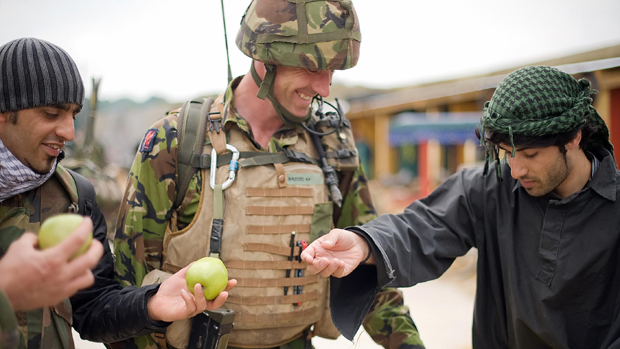Afghan interpreters can live in UK to avoid Taliban revenge
Government climbdown gives 600 interpreters right to move, but what message does it send?

A free daily email with the biggest news stories of the day – and the best features from TheWeek.com
You are now subscribed
Your newsletter sign-up was successful
UP TO 600 Afghan interpreters who risked their lives to aid British troops in Afghanistan are to be given the right to move to Britain. The government had initially opposed plans to offer Afghan interpreters the same resettlement rights as those afforded their Iraqi counterparts after the conflict in that country, but had a change of heart after what The Times calls a "backlash". Interpreters who worked alongside British troops on the frontline for a year or more will now be allowed to bring their families to Britain on a five-year visa. When it expires they will be able to apply for leave to stay indefinitely. "The package represents a climbdown from earlier suggestions that most interpreters would have to risk reprisals as collaborators by the Taliban after coalition forces leave a still unstable country at the end of 2014," says The Guardian. "There was... a fear that a blanket right to come to the UK would be taken as a signal that security will collapse, and reprisals proliferate, once the coalition forces depart at the end of 2014." Other Afghans who were employed as cooks and guards by the British army will also be offered a better financial package once it pulls out. The Times, which has campaigned on the issue, says the government has taken the right decision. "To place yourself in the firing line in a military conflict is the most onerous duty that a state can demand of its citizens. Taking on extreme danger should also be enough to warrant the granting of asylum for nationals of another country," it argues. The Daily Mail points out that a survey of interpreters in Afghanistan found that 94 per cent had received threats after working for the British and only three per cent said they would feel safe in the country once the UK troops were gone. Not everyone agrees. Among those arguing against encouraging the interpreters to move to the UK is the former Welsh Guards officer Crispin Black. "Immigration is a zero-sum game,” he wrote for The Week recently. “The qualities and energies some immigrants bring to their new countries are lost to their old ones.
“The Afghan interpreters who have helped our boys are precisely the sort of people who are going to be needed in the future Afghanistan when the Western troops depart."
A free daily email with the biggest news stories of the day – and the best features from TheWeek.com
The Week
Escape your echo chamber. Get the facts behind the news, plus analysis from multiple perspectives.

Sign up for The Week's Free Newsletters
From our morning news briefing to a weekly Good News Newsletter, get the best of The Week delivered directly to your inbox.
From our morning news briefing to a weekly Good News Newsletter, get the best of The Week delivered directly to your inbox.
-
 The environmental cost of GLP-1s
The environmental cost of GLP-1sThe explainer Producing the drugs is a dirty process
-
 Greenland’s capital becomes ground zero for the country’s diplomatic straits
Greenland’s capital becomes ground zero for the country’s diplomatic straitsIN THE SPOTLIGHT A flurry of new consular activity in Nuuk shows how important Greenland has become to Europeans’ anxiety about American imperialism
-
 ‘This is something that happens all too often’
‘This is something that happens all too often’Instant Opinion Opinion, comment and editorials of the day
-
 Epstein files topple law CEO, roil UK government
Epstein files topple law CEO, roil UK governmentSpeed Read Peter Mandelson, Britain’s former ambassador to the US, is caught up in the scandal
-
 Iran and US prepare to meet after skirmishes
Iran and US prepare to meet after skirmishesSpeed Read The incident comes amid heightened tensions in the Middle East
-
 Israel retrieves final hostage’s body from Gaza
Israel retrieves final hostage’s body from GazaSpeed Read The 24-year-old police officer was killed during the initial Hamas attack
-
 China’s Xi targets top general in growing purge
China’s Xi targets top general in growing purgeSpeed Read Zhang Youxia is being investigated over ‘grave violations’ of the law
-
 Panama and Canada are negotiating over a crucial copper mine
Panama and Canada are negotiating over a crucial copper mineIn the Spotlight Panama is set to make a final decision on the mine this summer
-
 Why Greenland’s natural resources are nearly impossible to mine
Why Greenland’s natural resources are nearly impossible to mineThe Explainer The country’s natural landscape makes the task extremely difficult
-
 Iran cuts internet as protests escalate
Iran cuts internet as protests escalateSpeed Reada Government buildings across the country have been set on fire
-
 US nabs ‘shadow’ tanker claimed by Russia
US nabs ‘shadow’ tanker claimed by RussiaSpeed Read The ship was one of two vessels seized by the US military